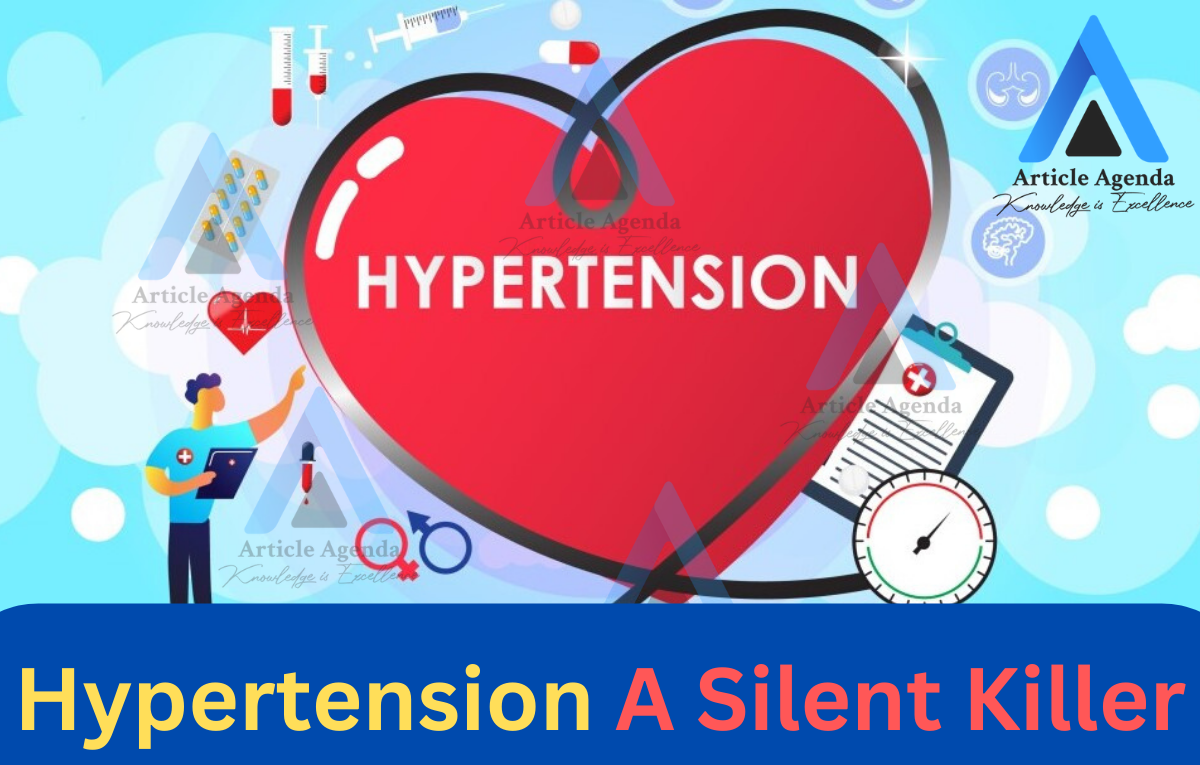Introduction to Hypertension
Hypertension, also known as high blood pressure, is a common medical condition affecting millions worldwide. It occurs when the force of blood against the walls of the arteries is consistently too high, putting excessive strain on the heart. Unfortunately, hypertension often goes unnoticed as it rarely presents with noticeable symptoms. This is why it is often called the “silent killer.”
Table of Contents
- Introduction to Hypertension
- The Dangers of Hypertension
- Causes and Risk Factors of Hypertension
- Symptoms and Signs of Hypertension
- Diagnosing Hypertension
- Complications of Untreated Hypertension
- Treating Hypertension: Lifestyle Changes and Medication
- Tips for Managing Hypertension
- Preventing Hypertension
- Conclusion: Taking Control of Your Health
- Latest Post:
The Dangers of Hypertension
While hypertension may not cause immediate symptoms, it can have serious long-term consequences if left untreated. The constant pressure in the arteries can damage blood vessels, leading to atherosclerosis or plaque buildup. This can restrict blood flow to vital organs such as the heart, brain, and kidneys, increasing the risk of heart attacks, strokes, and kidney disease.
Moreover, hypertension can also put a strain on the heart, causing it to become enlarged and weakened over time. This can lead to heart failure, a condition where the heart is unable to pump enough blood to meet the body’s needs. Additionally, hypertension is closely associated with other health conditions such as diabetes, obesity, and high cholesterol, further increasing the risk of complications.
Read More: Unlocking the Benefits of a Healthy Sahulat Program: The Ultimate Guide
Causes and Risk Factors of Hypertension
The exact cause of hypertension is often unknown, but several risk factors have been identified. Age, family history, and race are non-modifiable risk factors that can increase the likelihood of developing hypertension. Lifestyle choices, such as a poor diet high in salt and saturated fats, lack of physical activity, excessive alcohol consumption, and smoking, can also contribute to the development of hypertension.
Certain medical conditions, including kidney disease, hormonal disorders, and sleep apnea, can also cause or contribute to hypertension. Stress and chronic conditions like diabetes and high cholesterol can also be contributing factors. It is essential to be aware of these risk factors and make lifestyle changes to reduce the risk of developing hypertension.
Read More: Why State Life Insurance is the Ideal Choice for Protecting Your Future
Symptoms and Signs of Hypertension
As mentioned earlier, hypertension is often asymptomatic, which means it does not present with obvious signs or symptoms. This is why it is crucial to have regular blood pressure checks to detect hypertension early. In some cases, individuals with high blood pressure may experience symptoms such as headaches, dizziness, blurred vision, and shortness of breath. However, these symptoms are not specific to hypertension and can be associated with other conditions as well.
Diagnosing Hypertension
Diagnosing hypertension involves measuring blood pressure using a blood pressure cuff, stethoscope, or an automatic blood pressure monitor. The readings are recorded in two numbers: systolic pressure and diastolic pressure. A blood pressure reading of 120/80 mmHg or lower is considered normal, while readings consistently above this range may indicate hypertension.
It is important to note that a single high blood pressure reading does not necessarily mean you have hypertension. Blood pressure can fluctuate throughout the day, so multiple tasks taken on different days are required for an accurate diagnosis. If hypertension is suspected, your doctor may recommend additional tests to assess organ damage and identify any underlying medical conditions.
Read More: Blood Pressure 101: Everything You Need to Know About Your Blood Pressure Readings
Complications of Untreated Hypertension
Untreated hypertension can have severe consequences on your health. Over time, the increased pressure in the arteries can damage blood vessels and organs, leading to various complications. One of the most common complications is cardiovascular disease, which encompasses conditions such as heart attacks, strokes, and heart failure.
Hypertension can also lead to kidney damage and kidney failure, as the constant high pressure can impair the kidneys’ ability to filter waste products from the blood. Additionally, hypertension is a significant risk factor for peripheral artery disease, a condition that affects the blood vessels in the legs and can lead to pain, numbness, and even amputation.
Read More: High Blood Pressure Symptoms and Causes
Treating Hypertension: Lifestyle Changes and Medication
The first line of treatment for hypertension often involves lifestyle modifications. These include adopting a healthy diet rich in fruits, vegetables, whole grains, lean proteins, and low-fat dairy products. Reducing sodium intake is crucial, as excessive salt consumption can contribute to high blood pressure. Regular physical activity like brisk walking, jogging, or swimming can also help lower blood pressure.
In some cases, lifestyle changes alone may not be sufficient to control hypertension, and medication may be prescribed. Several classes of medications can effectively lower blood pressure, including diuretics, ACE inhibitors, beta-blockers, and calcium channel blockers. The choice of drugs depends on various factors, including your overall health, any underlying medical conditions, and potential side effects.
Tips for Managing Hypertension
Managing hypertension requires ongoing commitment and lifestyle adjustments. Here are some tips to help you keep your blood pressure under control:
1. Monitor your blood pressure regularly and record your readings.
2. Follow a healthy diet low in sodium, saturated fats, and cholesterol.
3. Engage in regular physical activity, aiming for at least 150 minutes of moderate-intensity weekly exercise.
4. Maintain a healthy weight by adopting a balanced diet and an active lifestyle.
5. Limit alcohol consumption and quit smoking, as both can raise blood pressure.
6. Manage stress through relaxation techniques like deep breathing exercises, meditation, or yoga.
7. Take prescribed medications as directed and attend regular check-ups with your healthcare provider.
Read More: The Silent Epidemic: Eye Infections in Pakistan
Preventing Hypertension
While some risk factors for hypertension cannot be changed, there are steps you can take to prevent its development. Adopting a healthy lifestyle from an early age can significantly reduce the risk of hypertension. This includes maintaining a healthy weight, eating a balanced diet, exercising regularly, limiting alcohol consumption, and avoiding smoking.
Regular check-ups with your doctor can help identify any early signs of hypertension and allow for timely intervention. If you have a family history of hypertension or other related conditions, it is essential to be proactive in managing your health. By making these positive changes, you can reduce your risk of developing hypertension and its associated complications.
Read More: 5 Diseases whose Infection Can Kill You
Conclusion: Taking Control of Your Health
Hypertension is a severe medical condition that can have detrimental effects on your health if left untreated. By understanding hypertension’s risks, symptoms, and consequences, you can take control of your health and make the necessary lifestyle modifications to manage the condition effectively.
Remember, managing hypertension is a lifelong commitment. Regular check-ups with your doctor, monitoring your blood pressure, and adhering to a healthy lifestyle are crucial to preventing complications and maintaining overall well-being. Taking proactive steps can protect yourself from the silent killer and lead a healthier, happier life.
Call to Action:
- Please don’t wait until it’s too late.
- Take control of your health today by scheduling a blood pressure check-up with your healthcare provider.
- Remember, prevention is always better than cure.
Latest Post:
-
Smart Home Appliances in the UAE: Revolutionizing Modern Living
The UAE has long been recognized as a hub for innovation and technological advancement, and the adoption of smart home appliances is no exception. As the nation embraces the concept of smart homes, residents are experiencing a transformation in their daily lives, characterized by increased convenience, efficiency, and sustainability. This article explores how smart home…
-
(Artificial Intelligence) AI and ML (Machine Learning) : Transforming the Future
Artificial Intelligence (AI) and Machine Learning (ML) are two of the most transformative technologies of our time. They are reshaping industries, driving innovation, and opening up new possibilities in ways previously unimaginable. This article explores the fundamentals of AI and ML, their applications, and their profound impact on various sectors. Understanding Artificial Intelligence (AI) What…
-
Digital Marketing Services: Transforming Your Business in the Digital Age
In today’s digital-first world, businesses must leverage digital marketing services to remain competitive, attract customers, and drive growth. Digital marketing encompasses a broad range of tactics and strategies aimed at promoting products or services through digital channels. This article delves into the various types of digital marketing services available, their benefits, and how businesses can…








daktilogibigibi.XRCjsN9VVpRz
daxktilogibigibi.WCxQlm22J9yS
yandanxvurulmus.0VSlDddV7LGY
xbunedirloooo.S9baa8cheOzG
balneation xyandanxvurulmus.R7BtJ5RwJPcQ
overate xyandanxvurulmus.MVdtMRmMVHvh
bahis siteleri child porn vurgunyedim.0aJcz4gnIsSd
watch porn video yaralandinmieycan.RFcTraY0PBRX
bahis siteleri porn citixx.hbvRnDSeQsFf
bahis siteleri child porn hyuqgzhqt.D7qIEMeb8DyZ
anal sikis siteleri ewrjghsdfaa.NSw3CCcxcIba
porno wrtgdfgdfgdqq.vbKf3XVsjT6g
watch porn video pompadirha.CTfNXZqtNCUY
bahis siteleri porn sex incest asillartaklitler.k1QSVCAbEyzq
porno hephupx.pE5WzkCjbrKc
BİZİ SİK BİZ BUNU HAK EDİYORUZ hepxhupx.qEMEEQlaukB9
escort juljulfbi.oyVJdca8VRNJ
porno bjluajszz.cw2Kg0JqXbFd
anal sikis siteleri bxjluajsxzz.ZykN3p7YBbBL
house porn 0qbxjluaxcxjsxzz.5jGmREcC16YI
porn 250tldenemebonusuxx.U9Kjl2mDdt1N
childrens sex eyeconartxx.88cGIIwFhErp
bahis siteleri porn vvsetohimalxxvc.4g0ZT2yDaxAM
sexx tthighereduhryyy.QW2xCk2Wf5f
Vapes, also known as electronic cigarettes, are devices that vaporize a liquid solution for inhalation. Popular among smokers as an alternative, they come in various flavors and designs.
hd full porn site gghkyogg.xc5sDWPwksc
hd porn sex videos download ggjennifegg.hZE1LYmWtgH
hd 4k sex video ggjinnysflogg.yabIUvKGtkl
fashionflag free porn download hd fashionflag.oym5CJmUz9s
goodhere Casting porn vurucutewet.obFSMOAd7Wa
ladyandtherose Black and White porn backlinkseox.alEQQJeMBT9
jenniferroy 漫画ポルノ japanesexxporns.EgiVLtLUd0K
landuse Shemale porn lancdcuse.FVfqBJEFYLI
falbobrospizzamadison Fetish porn jkkıjxxx.bkIVTOlzfTN
I like this web blog it’s a master piece! Glad I observed this ohttps://69v.topn google.Raise your business